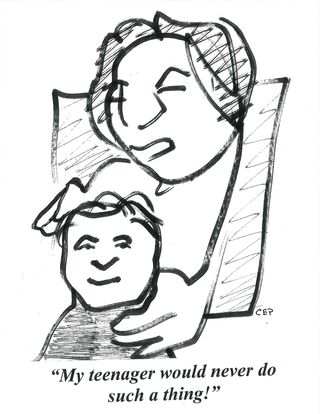Relationships
Growing a Satisfying Relationship With Your Adult Child
In some ways parents need to step back if they want to stay closely connected.
Posted September 30, 2019

The challenges of parenting never end, thus the question: “Assuming an older adolescent has successfully transitioned into young adulthood, what adjustments might a parent want to make so closeness between them can continue to grow?"
Start with appreciating basic challenges that young adulthood can bring.
Young Adulthood
When is the end of adolescence? Usually by the early to mid-twenties, a young person shows evidence that growing up is drawing to a close in two ways: a functional independence and a fitting identity are claimed. “I’m on my own and I know who I am.”
Young adulthood (around ages 23 – 30) is the Age of Emancipation and the Age of Assessment, challenging on both counts.
- Emancipation is declared as freedom from dependency on parents becomes a responsibility for self-direction, motivation, supervision, and support. “I follow my lead, maintain myself, and cope with the consequences of my choices, both good and ill.”
- Assessment is declared as self-evaluation appraises the individual they have turned out to be, confronting the personal hand of characteristics and capacities they must play the best they can. “I recognize the strengths and weaknesses on which I must depend to make my way forward in life.”
At this vulnerable age, the grown daughter or son doesn’t need either doubt or criticism from parents since the young adult has enough of both on their own. Rather, she or he needs their expression of faith and confidence.
Young adulthood is a very self-absorbing stage of growth, for some young people almost as powerful as the adolescent transformation. Becoming a free-standing person is exciting and scary and difficult to do: "At times, it’s hard accepting I’m not all I wish to be and what I need to work on to get better.”
Every day can feel like a new audition, trying out for the adult role one is now expected to play. Encountered are many accommodations between what one ideally wants in life and what can realistically get: “There’s a lot of let-down when you finally grow up.” And self-appraisal can take a downward turn: “I’m not as capable as I thought I would be.”
As for parents, they often face some common losses in the process of letting go in order to stay caringly and communicatively well-connected to their developing adult child.
Parental Losses
A number of common loss adjustments are suggested below.
- Demotion: parents lose positional superiority. Interpersonal standing is now equitized.
“I can’t pull rank of ruling authority anymore.”
- Distance: parents lose central importance. Parents become more peripheral to young adult life.
“I’m more of an outsider now.”
- Disappointment: parental expectations are unmet. Old dreams do not match the emerging reality.
“He didn’t turn out all the ways I anticipated.”
- Disapproval: parents don't like some daily decisions being made. In the young person’s place, they would choose differently.
“We don’t agree with her priorities.”
- Diversity: parents lose some old sense of similarity. The adult child life is increasingly unfamiliar.
“Her lifestyle is so different from ours.”
- Despondency: parents lose accustomed contact. Primary intimacy and importance are found elsewhere.
“I miss the old closeness we used to share.”
- Deprivation: parents lose current information. They feel more out of touch with what is happening.
“I'm not regularly told what is going on.”
- Directness: parents lose spontaneity of communication. There is more talking carefully.
“I’m more diplomatic about what I say and how I say it.”
Straining the Relationship
Of course, these adjustments are not mandatory. Some parents will object to them, and that may be fine. But if not, consider how the parent/adult child relationship might be strained when these adjustments are declined;
Demotion: “I’m still your parent and you will do as I say.” (Control)
Distance: “I will continue to be an active part of your daily life.” (Involvement)
Disappointment: “You will fulfill the expectations we set for you.” (Ambition)
Disapproval: “You are making immature decisions.” (Criticism)
Diversity: “How we live our life is how we expect you to live yours.” (Similarity)
Despondency: “We’ll stay together like you never left home.” (Community)
Deprivation: “You will keep us up to date as you always have.” (Intimacy)
Directness: “I will continue to speak my mind as usual.” (Candor)
Role Adjustments
Proceeding as though your adult child will stay as family-centered as the adolescent usually doesn’t work too well. Instead, by emphasizing certain parental roles, more closeness can often grow. A few suggestions follow.
- Parents can become cheerleaders – celebrating accomplishments.
- Parents can become supporters – providing listening.
- Parents can become motivators – encouraging effort.
- Parents can become followers – expressing interest
- Parents can become mentors – advising when asked.
- Parents can become companions – providing welcome company.
- Parents can become independents – leading separate lives.
- Parents can become informants – sharing home and family news.
- Parents can become helpers – being on family call.
- Parents can become requestors -- asking for assistance.
Now begins a new grown-up living side-by-side as separate individuals, parents content to operate more on the young adult’s terms. For the young person, parents become of less daily focus, although no less loved. They have simply been moved at a further distance as the more self-absorbed young person places a necessary priority on building and conducting an independent life.




